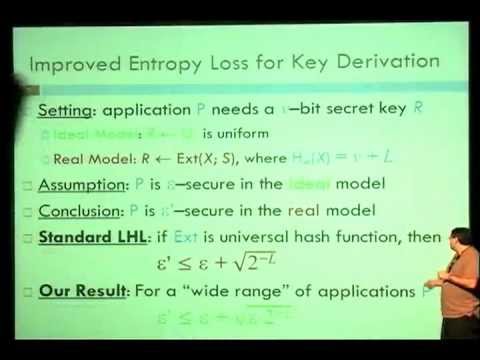Welcome to the resource topic for 2011/088
Title:
Leftover Hash Lemma, Revisited
Authors: Boaz Barak, Yevgeniy Dodis, Hugo Krawczyk, Olivier Pereira, Krzysztof Pietrzak, Francois-Xavier Standaert, Yu Yu
Abstract:The famous Leftover Hash Lemma (LHL) states that (almost) universal hash functions are good randomness extractors. Despite its numerous applications, LHL-based extractors suffer from the following two drawbacks: (1) Large Entropy Loss: to extract v bits from distribution X of min-entropy m which are e-close to uniform, one must set v <= m - 2log(1/e), meaning that the entropy loss L = m-v >= 2log(1/e). (2) Large Seed Length: the seed length n of (almost) universal hash function required by the LHL must be at least n >= min(u-v, v + 2*log(1/e))-O(1), where u is the length of the source. Quite surprisingly, we show that both limitations of the LHL — large entropy loss and large seed — can often be overcome (or, at least, mitigated) in various quite general scenarios. First, we show that entropy loss could be reduced to L=log(1/e) for the setting of deriving secret keys for a wide range of cryptographic applications. Specifically, the security of these schemes gracefully degrades from e to at most e + sqrt(e * 2^{-L}). (Notice that, unlike standard LHL, this bound is meaningful even for negative entropy loss, when we extract more bits than the the min-entropy we have!) Based on these results we build a general computational extractor that enjoys low entropy loss and can be used to instantiate a generic key derivation function for any cryptographic application. Second, we study the soundness of the natural expand-then-extract approach, where one uses a pseudorandom generator (PRG) to expand a short “input seed” S into a longer “output seed” S’, and then use the resulting S’ as the seed required by the LHL (or, more generally, any randomness extractor). Unfortunately, we show that, in general, expand-then-extract approach is not sound if the Decisional Diffie-Hellman assumption is true. Despite that, we show that it is sound either: (1) when extracting a “small” (logarithmic in the security of the PRG) number of bits; or (2) in minicrypt. Implication (2) suggests that the sample-then-extract approach is likely secure when used with “practical” PRGs, despite lacking a reductionist proof of security! Finally, we combine our main results to give a very simple and efficient AES-based extractor, which easily supports variable-length messages, and is likely to offer our improved entropy loss bounds for any computationally-secure application, despite having a fixed-length seed.
ePrint: https://eprint.iacr.org/2011/088
Talk: https://www.youtube.com/watch?v=9ke2OSpvQ64
Slides: http://www.iacr.org/cryptodb/archive/2011/CRYPTO/presentation/01-1-Dodis.pdf
See all topics related to this paper.
Feel free to post resources that are related to this paper below.
Example resources include: implementations, explanation materials, talks, slides, links to previous discussions on other websites.
For more information, see the rules for Resource Topics .
